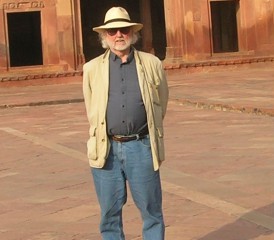Mesothelioma Survivor Teaches Others by Example

Fact Checked | Written by: Tim Povtak | Last Update: 10/23/2024 | 5 Min Read
Ward S. doesn’t sound like a 79-year-old man battling malignant pleural mesothelioma.
He sounds like a man making plans for a very busy future.
“I’m happy right now, in great shape,” Ward said from his home in Rhinebeck, N.Y. “Sure, this cancer can slow you down. Just being 79 gets in the way of a lot of things, but it’s a good life, generally. And now that I can have a drink again every once in a while, it’s an even better life.”
Ward, whose last name is being withheld over privacy concerns, is a retired professor who taught for 30 years at the University of The Arts in Philadelphia. He is still recovering from an 11-hour surgery in April that included a pleurectomy/decortication. That was followed by photodynamic therapy and more chemotherapy.
“I’m optimistic. With that surgery, I think I’m almost guaranteed another two to three years,” he said. “But I say that with some reservation. It could be 10 years, or it could come back tomorrow. Either way, I’m making plans.”
Spring Looms as Busy Period for Mesothelioma Survivor
Ward already has begun preparing lectures for a Lifetime Learning Program he will teach at nearby Bard College in the spring. He is planning a trip to Buffalo early in 2013 for the annual Society of Architectural Historians. And he also expects to be with his family next summer in Ireland, where they will visit the town where his ancestors were born.
His return to an active lifestyle after such serious cancer surgery was quicker than expected, especially for someone his age, and it has served as a beacon of hope for other mesothelioma patients.
His surgeon was Joseph Friedberg, M.D., from the Abramson Cancer Center in Philadelphia, and Friedberg asked him to participate in a mesothelioma panel discussion at an upcoming seminar.
Since surgery, Ward traveled to Washington, D.C., for the Mesothelioma Applied Research Foundation (MARF) annual meeting in July, and to New York City, where MARF held a day-long seminar on mesothelioma in September. Ward left both events feeling better about himself and his situation with mesothelioma.
“Those meetings I went to were invigorating for me. It was the first time I realized ‘I’m not alone in this.’ I guess it might be sad seeing people dying in front of your eyes, but you see others surviving and doing quite well,” he said. “I’d advise anyone who is just diagnosed (with mesothelioma) to get involved with these meso groups, and talk to other people. It gave me hope.”
Ward is a double survivor. He outlasted a bout with bladder cancer a decade ago.
Mesothelioma was different because he knew so little about it. Up to 3,000 Americans each year are diagnosed with the cancer caused by an exposure to asbestos — a small number that often goes overlooked among cancers.
“In a macabre sort of way, it’s like a privileged club, like being in a small fraternity or sorority,” Ward said. “There is a real esprit de corps. In Washington I met one woman from England who was really interesting. There was the tall blond with all the tattoos. All kinds of people.”
Mesothelioma Diagnosis Was A Surprise
Ward was as shocked as anyone with his original diagnosis in February of 2012. He was a full-tenured professor who taught architectural history. He had quit smoking at age 50 and begun a rigorous race-walking program that included 25 miles per week. He had retired in his late 50s so he and his wife could move to New York state and manage a bed-and-breakfast establishment that they always wanted to do.
His good health and conditioning was one reason that he was eligible for the lengthy surgery that he withstood so well. It’s also a reason why he rebounded so quickly. Today, he works in his garden, tends to his lawn and still walks, although much shorter distances.
He believes his asbestos exposure stemmed from long ago, during his early 20s when he did construction work, roofing homes, laying sewer pipes, serving as a steam fitter. He often did brake work on his car, and the cars of others, to make extra cash. It’s how he worked his way through college.
“This is a terminal cancer, so it’s easy to get depressed. Mesothelioma is vicious once it gets rolling,” he said. “But I set goals. I want to see my (three) grandchildren grow up. I’ve met survivors who last 10 years. I’ve seen others who don’t last 10 months. There are so many variables you can’t control.”
Ward still sees a doctor every three months, although he hopes to extend those visits to every six months, then once every year. He has kept in contact with the survivors that he met in July at the mesothelioma conference in Washington.
They take turns providing pick-me-up tips. He has invited a few of them to his upcoming lectures this spring.
“The surgery, and the debilitation of cancer, definitely has slowed me down,” he said. “But it has not stopped me. I don’t think it will.”





